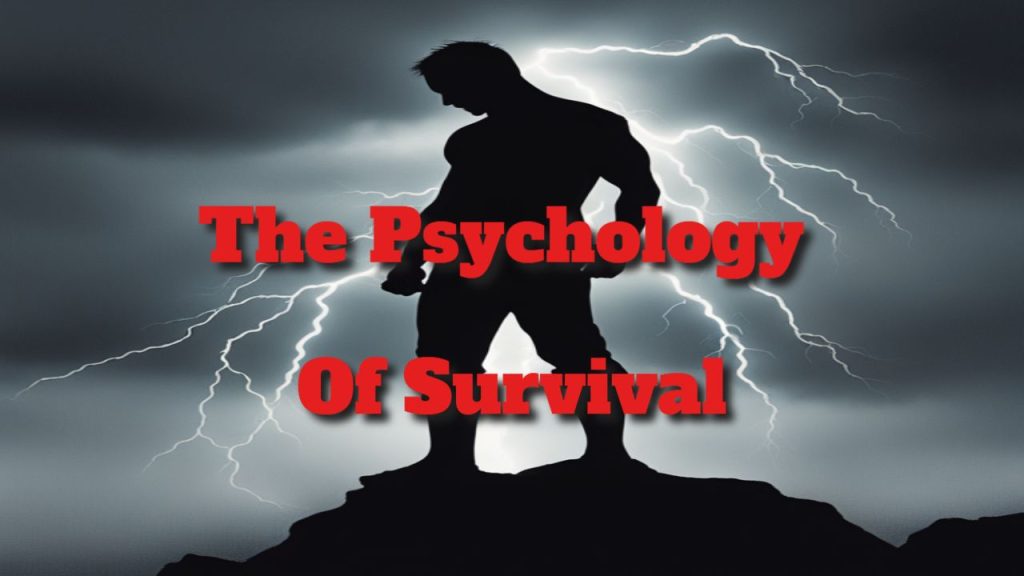Master Survival Psychology: Essential Strategies for Thriving in High-Pressure Situations
The timeless phrase, “desperate times call for desperate measures,” encapsulates the essence of survival, particularly as we delve into the intricate dynamics of survival psychology. In the face of extreme threats, the human psyche undergoes a remarkable transformation, awakening profound reservoirs of strength and resilience that typically lie dormant in our daily lives. This transformation is not just a reflexive response; it signifies a holistic activation of both mental and emotional faculties, illustrating the extraordinary capabilities of our minds when confronted with adversity. By understanding these psychological shifts, individuals can significantly enhance their survival skills and mental toughness, equipping themselves to handle crises more effectively.
During moments of life-threatening danger, a complex interplay of psychological mechanisms is triggered. But what exactly transpires within our minds when time is of the essence? How do we make critical decisions under overwhelming pressure? Furthermore, how does our inherent psychological framework shape our ability to endure, adapt, and ultimately thrive in chaotic environments? These questions lie at the heart of survival psychology, a topic we will explore extensively throughout this detailed article. By illuminating the core elements that empower us to withstand challenges, we can glean invaluable insights into our own innate capabilities and behavioral responses during crises.
Join us on an enlightening journey into the fascinating realm of survival psychology, where we will dissect its complexities and reveal the pivotal factors that determine our ability to overcome obstacles and succeed in life-threatening scenarios.
Understanding the Profound Influence of Fear on Survival Responses and Decision-Making
Fear is a fundamental component of our survival instincts, serving as a primal response that prepares our bodies to react swiftly to potential threats. This intense emotion initiates a series of physiological changes designed to optimize our chances of survival during dangerous encounters. When fear grips us, our heart rate increases, our breathing quickens, and our muscles tense, creating a heightened state of alertness that primes us for immediate action. Grasping this physiological aspect is crucial for anyone aiming to enhance their survival response and overall effectiveness in high-stress situations.
This acute readiness sharpens our reflexes and accelerates decision-making, empowering us to confront imminent dangers with greater efficiency. Furthermore, fear amplifies our sensory perception, allowing us to observe our surroundings with heightened acuity and identify potential threats that might otherwise go unnoticed. It compels us to focus intently on our environment, boosting vigilance and helping us recognize crucial warning signs essential for survival. In the absence of fear, our ability to navigate perilous scenarios could be significantly compromised, underscoring its vital role in our survival toolkit. By understanding the intricate relationship between fear and survival mechanisms, we deepen our appreciation for the complexities of the human experience while arming ourselves with practical knowledge that can be applied in real-life situations.
Developing Resilience to Navigate Life’s Challenges with Confidence
When confronted with fear in high-stakes scenarios, the ability to cultivate resilience becomes paramount in the ongoing struggle for survival. Resilience is defined as the capacity to recover from adversity, adapt to challenges, and bounce back from setbacks, even when faced with daunting obstacles. This critical quality often distinguishes those who succumb to despair from those who muster the inner strength to persist in their survival efforts. Actively fostering resilience is a proactive measure that anyone can undertake to enhance their overall life experience.
However, resilience does not imply the absence of fear or pain; rather, it embodies the steadfast determination to push forward despite emotional upheaval. It involves nurturing a positive mindset, setting attainable goals, and effectively utilizing available resources to navigate hardships. By developing resilience, individuals empower themselves to confront life’s hurdles with confidence, equipped with the insights and strategies necessary to prevail. This transformative mindset not only proves beneficial in survival circumstances but also enriches one’s broader life experience, instilling hope and allowing individuals to tackle future challenges with renewed vigor and determination.
Sharpening Decision-Making Skills Under Pressure for Optimal Outcomes
The ability to make sound decisions can be severely compromised in high-stress environments. The inherent urgency and pressure characteristic of these critical moments can cloud our judgment, leading to hasty or ill-considered choices. During stressful episodes, the brain activates a heightened arousal state, triggering the fight-or-flight response, which can overwhelm rational thought processes and drive individuals to rely more on instinct than careful analysis. Recognizing these patterns is essential for developing effective strategies to enhance decision-making under pressure.
This physiological response can obstruct cognitive functions, making it increasingly challenging to process information and assess the pros and cons of different options. To mitigate these effects, it is crucial to understand how stress influences our decision-making abilities and to actively implement techniques that can lessen its impact. Strategies such as practicing deep breathing exercises, allowing for brief moments of reflection, or seeking guidance from trusted individuals can significantly improve one’s capacity to make informed and effective decisions. By honing decision-making skills in high-pressure contexts, individuals can markedly enhance their chances of successfully navigating challenging and potentially life-threatening situations.
The Crucial Importance of Social Support in Crisis Management
Recognizing the critical role of social support is essential for effectively managing stressful situations. A robust network of friends, family, and colleagues provides invaluable assistance and resources, enabling individuals to cope and thrive during challenging times. The emotional backing, practical help, and sense of belonging that social connections offer are vital for fostering resilience and enhancing overall well-being. In any crisis, the strength derived from social support can truly be a game changer.
Research consistently shows that individuals with strong social networks enjoy superior mental health outcomes and recover more swiftly from traumatic experiences. Additionally, having a support system enhances problem-solving abilities, presents new perspectives, and provides essential motivation and encouragement. Acknowledging the transformative power of social networks during crises can significantly alter one’s experience, allowing individuals to draw strength and insights from others when needed. Engaging with a supportive community not only aids in coping with immediate challenges but also contributes to long-term emotional resilience and recovery, reinforcing the concept that we are not alone in our struggles.
 Implementing Effective Coping Strategies for High-Stress Scenarios
Implementing Effective Coping Strategies for High-Stress Scenarios
What actionable strategies can be employed to navigate life-threatening situations successfully? Here are some practical tips:
– Stay Calm and Focused: Take a moment to breathe deeply and assess your surroundings before taking action. This approach can help clarify your thoughts and enhance your focus.
Prioritize Safety: Protect yourself and others by seeking shelter or moving away from immediate threats whenever feasible. Your safety should always be the top priority.
– Maintain Awareness: Remain vigilant about your surroundings, paying attention to potential dangers or changes in the environment that could impact your safety.
– Communicate Clearly: If necessary, signal for help or inform others of the danger you face. Effective communication can be vital in survival scenarios.
– Trust Your Instincts: Rely on your gut feelings and make swift decisions based on the information available to you. Your instincts can provide invaluable guidance.
– Utilize Available Resources: Maximize the use of all accessible tools and resources to enhance your chances of survival, whether they are physical tools or social support.
– Foster an Optimistic Mindset: Cultivate a belief in your ability to overcome challenges. A positive outlook can significantly influence your resilience and responses.
Effective Coping Strategies for Trauma Survivors and Individuals with PTSD
For individuals with a history of trauma or PTSD, employing effective coping strategies during life-threatening situations is essential for managing anxiety and fostering resilience. Customizing these strategies can empower individuals to regain control over their reactions.
– Practice Deep Breathing Techniques: Utilize grounding methods to stabilize anxiety levels and promote a sense of calm. Deep breathing can help center your thoughts and reduce feelings of panic.
– Seek Social Support: Do not hesitate to reach out to friends, family, or mental health professionals for assistance. Connecting with others can provide vital support during challenging moments.
– Engage in Self-Care Practices: Prioritize activities that promote mental and physical well-being, aiding in recovery and resilience building over time.
These coping mechanisms are essential for managing anxiety and nurturing resilience. It’s important to recognize that resilience is not merely an inherent trait; it can be actively cultivated through consistent practice and support. With the right strategies in place, anyone—regardless of their background—can enhance their ability to rebound from difficult situations.
Moreover, understanding how decision-making under stress impacts long-term mental health and recovery from traumatic experiences is crucial. The manner in which decisions are made in high-pressure situations can profoundly influence recovery trajectories and overall mental well-being in the aftermath of life-threatening events.
Identifying the psychological barriers individuals encounter when seeking social support during crises is equally important. Common challenges during these critical moments may include feelings of vulnerability, fear of judgment, trust issues, and difficulties in articulating one’s needs. Recognizing these obstacles is vital, as they can impede the process of seeking help and exacerbate stress and anxiety.
To effectively navigate these challenges and access the necessary support, consider taking manageable steps such as confiding in a trusted friend, consulting a mental health professional, or joining a support group. Remember, seeking help is a courageous step, and there are individuals ready and willing to assist you when you need it most.
Exploring the Complex and Fascinating World of Survival Psychology
The psychology of survival represents a rich and multifaceted field that offers profound insights into human behavior. While anxiety is a natural response to life-threatening events, resilience is what empowers us to recover from adversity and continue moving forward. By understanding how stress influences decision-making, we can significantly boost our chances of survival. Furthermore, recognizing the vital role of social support provides the essential strength and comfort needed during challenging times.
Utilizing effective coping strategies empowers us to navigate complex and life-threatening situations more adeptly, ultimately enhancing resilience and leading to improved mental health outcomes. This exploration of survival psychology not only deepens our understanding of our own capabilities but also equips us with the practical tools necessary to confront unforeseen challenges with confidence and determination.
Frequently Asked Questions Regarding Survival Psychology
How do anxiety disorders affect survival psychology?
What psychological differences exist in survival responses between those with anxiety disorders and those without?
Individuals with anxiety disorders may demonstrate heightened reactions to fear and stress, while those without may utilize more adaptive coping strategies, leading to diverse survival outcomes.
What are the most effective coping mechanisms for trauma survivors or individuals with PTSD during survival situations?
The Article Survival Psychology: Understanding the Mindset Appeared First On Survival Avenue.
The post Survival Psychology: Mastering the Mindset appeared first on Survival Bite.
The Article Survival Psychology: Unlocking Your Mental Resilience Was Found On https://limitsofstrategy.com



Your insights on survival psychology are truly captivating. It really makes me reflect on how our minds can shift from ordinary day-to-day functioning to tapping into these hidden reservoirs of strength when faced with extreme situations. The process you describe—how emotional and mental faculties come alive under pressure—is something I’ve observed in various contexts, not just life-threatening ones.
Your observations tap into a fascinating aspect of human behavior. The notion that our minds can shift in extreme situations isn’t just academic; it resonates in everyday life in ways that often go unnoticed. It’s intriguing how many of us have moments—perhaps during a stressful work deadline or a personal crisis—when we discover our capacity to handle challenges we didn’t think we could manage.
It’s interesting you brought that up—I often wonder why we only seem to tap into those hidden reservoirs of strength when push comes to shove. Like, why can I muster a heroic level of inner fortitude while escaping a bear in the wild, but can barely summon the motivation to tackle my mountain of laundry on a Tuesday?
Thank you for your thoughtful reflections! If you’re interested in exploring this topic further, I invite you to check out additional resources that delve into the fascinating dynamics of survival psychology and resilience.
https://arquiaca.org/SmoothieRecipes